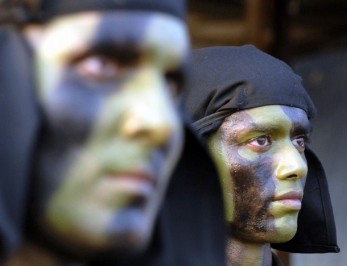D.E.A Commandos Attack Cartels that Cut Into Its Profits
November 8, 2011 1 Comment
Charlie Savage
New York Times
October 8, 2011
Late on a moonless night last March, a plane smuggling nearly half a ton of cocaine touched down at a remote airstrip in Honduras. A heavily armed ground crew was waiting for it — as were Honduran security forces. After a 20-minute firefight, a Honduran officer was wounded and two drug traffickers lay dead.
Several news outlets briefly reported the episode, mentioning that a Honduran official said the United States Drug Enforcement Administration had provided support. But none of the reports included a striking detail: that support consisted of an elite detachment of military-trained D.E.A. special agents who joined in the shootout, according to a person familiar with the episode.
The D.E.A. now has five commando-style squads it has been quietly deploying for the past several years to Western Hemisphere nations — including Haiti, Honduras, the Dominican Republic, Guatemala and Belize — that are battling drug cartels, according to documents and interviews with law enforcement officials.
The program — called FAST, for Foreign-deployed Advisory Support Team — was created during the George W. Bush administration to investigate Taliban-linked drug traffickers in Afghanistan. Beginning in 2008 and continuing under President Obama, it has expanded far beyond the war zone.
“You have got to have special skills and equipment to be able to operate effectively and safely in environments like this,” said Michael A. Braun, a former head of operations for the drug agency who helped design the program. “The D.E.A. is working shoulder-to-shoulder in harm’s way with host-nation counterparts.”
The evolution of the program into a global enforcement arm reflects the United States’ growing reach in combating drug cartels and how policy makers increasingly are blurring the line between law enforcement and military activities, fusing elements of the “war on drugs” with the “war on terrorism.”
Bruce Bagley, a University of Miami professor who specializes in Latin America and counternarcotics, said the commando program carries potential benefits: the American teams could help arrest kingpins, seize stockpiles, disrupt smuggling routes and professionalize security forces in small countries through which traffickers pass drugs headed to the United States.
But there are also potential dangers.
“It could lead to a nationalist backlash in the countries involved,” he said. “If an American is killed, the administration and the D.E.A. could get mired in Congressional oversight hearings. Taking out kingpins could fragment the organization and lead to more violence. And it won’t permanently stop trafficking unless a country also has capable institutions, which often don’t exist in Central America.”
Read Full Article…
